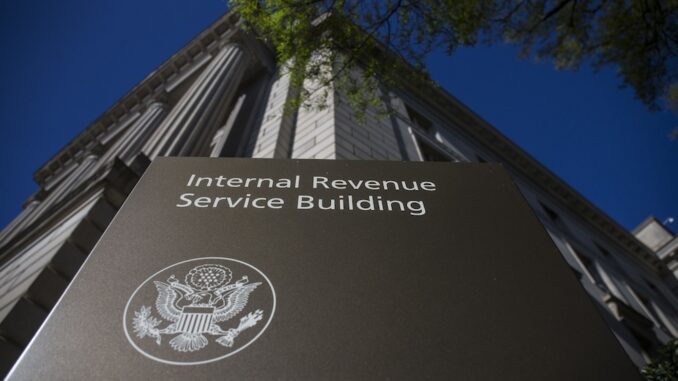
The Internal Revenue Service (IRS) issued a reminder to businesses regarding the impending deadline for submitting documentation pertaining to employee and contractor payments. They urged firms to ensure the timely submission of required paperwork by the end of the current month.
“The IRS reminds employers that Jan. 31 is the deadline for submitting wage statements and forms for independent contractors with the government,” as stated in a news release on January 9. “Employers must file their copies of Form W-2, Wage and Tax Statement, and Form W-3, Transmittal of Wage and Tax Statements, with the Social Security Administration by Jan. 31.” The purpose of Form W-2 is to document the yearly earnings of employees and the corresponding amount of taxes that have been deducted from their paychecks. Employers utilize Form W-3 to record the aggregate employee income.
“The Jan. 31 deadline also applies to Forms 1099-MISC, Miscellaneous Income, and Forms 1099-NEC, Nonemployee Compensation, that are filed with the IRS to report non-employee compensation to independent contractors.”
Businesses are required to submit Form 1099-MISC if they make payments of $600 or more in a given year for various expenses such as rents, medical and healthcare transactions, incentives and awards, and cash payments from a fictitious principle contract to a person, partnership, or estate.
Form 1099-NEC is sent when firms compensate a minimum of $600 for services provided by a non-employee individual or for compensation made to an attorney.
The IRS has announced the availability of a complimentary electronic-filing service for the Form 1099 series, which can be submitted using the Information Returns Intake System (IRIS).
IRIS enables businesses to electronically file a maximum of 100 returns simultaneously. “Filers can also use this online portal to prepare payee copies for distribution, file corrections, and request automatic extensions.”
Businesses that submit 10 or more forms per tax year are required to electronically file their returns, as stated by the tax office. The IRS published the most recent regulations pertaining to this obligation in February.
The regulations impact individuals who submit partnership returns, corporate income tax returns, registration statements, disclosure statements, unrelated business income tax returns, specified excise tax returns, withholding tax returns, specific information returns, notifications, and actuarial reports.
The agency rationalized this requirement by referencing the substantial influx of printed returns it collected on a yearly basis. “The IRS receives nearly 4 billion information returns per year and expects to receive nearly 5 billion by 2028. In 2019, the IRS still received nearly 40 million paper information returns, even though approximately 99 percent of all information returns for that year were e-filed.”
“In 2021, about 82 percent of all corporate income tax returns were e-filed, and almost 90 percent of partnership tax returns were e-filed. Further reducing the volume of paper returns filed frees up staff and resources to further enhance services for taxpayers and improves overall efficiencies while reducing postage, printing, shipping and storage, and their associated costs and burdens.”
Businesses encountering challenges in adhering to the e-filing prerequisites have the option to request hardship waivers to exempt them from these regulations.
As the deadline for submitting salary statements approaches rapidly, company owners must be attentive to specific considerations. Initially, it is imperative that they submit a request for a tax-filing extension no later than January 31st. Employers have the option to request a 30-day extension by sending in Form 8809, which is the Application for Extension of Time to File Information Returns.
Nevertheless, submitting Form 8809 will not prolong the deadline for providing wage statements to employees. To achieve this, it is necessary to search for a distinct extension.
Noncompliance with the deadline may lead to the imposition of penalties. The IRS imposes a fee of $60 for each information return or payee statement that a firm fails to pay promptly, provided that the delay does not exceed 30 days. A penalty of $120 will be imposed for files submitted after the deadline, starting from 31 days until Aug. 1.
A penalty of $310 will be assessed if the delay extends beyond August 1 or if the forms are not filed. If the IRS determines that a business deliberately neglected to file a form, it will impose a penalty of $630.
The IRS stated that “The maximum penalty is different for small businesses and large businesses, including government entities. There is no maximum penalty for intentional disregard.”
Nevertheless, “we may be able to remove or reduce the penalty if you acted in good faith and can show reasonable cause. If you have reasonable cause, and received Notice 972CG, respond within 45 days (60 days if you’re a foreign filer) before we assess the penalty.”
The Internal Revenue Service (IRS) has sent a reminder to businesses on the postponement of the $600 reporting criterion for Form 1099-K. The 1099-K form is applicable to individuals involved in activities such as gig work and casual sales, who generate additional revenue by marketing their services or commodities.
Commencing this year, a recent regulation from the Internal Revenue Service (IRS) mandates that third-party payment networks such as PayPal, Venmo, Amazon, and Square must provide users with Form 1099-K if they collect over $600 in total sales revenue from transactions involving goods and services within a single year. Previously, the minimum requirement for gross sales exceeded $20,000.
The American Rescue Plan Act of 2021 incorporated a provision that lowered the gross sales threshold from $20,000 to $600. The regulation was originally intended to be implemented in the fiscal year 2022. Nevertheless, the IRS rescheduled it for the tax year of 2023.
The IRS has said that “This means that for 2023 and prior years, payments apps and online marketplaces are only required to send out Forms 1099-K to taxpayers who receive over $20,000 and have over 200 transactions. For tax year 2024, the IRS plans for a threshold of $5,000 to phase in reporting requirements,”
